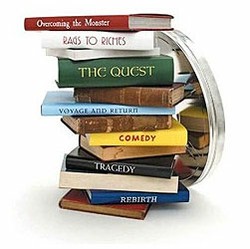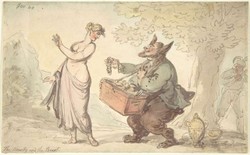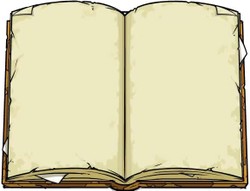Okay, I'm just going to write it loud and proud: there is no such thing as originality in storytelling.
Just as there are only eight musical notes from which every symphony, opera and pop song has been created; there are only seven types of story from which every single piece of literature, theater and film you've ever seen has spawned from.
Yes, seven. Just seven types of story. At least, as far as Christopher Brooker (see his book below), is concerned. So, the next time you're reading a novel and wondering why it feels like you've read it before, it's because you probably have - it just took a slightly different form.
So, what are these seven story types?















 How to Avoid College Debton 07/31/2014
How to Avoid College Debton 07/31/2014
 Was Charlotte Bronte Jealous of her Sister Anne?on 07/15/2014
Was Charlotte Bronte Jealous of her Sister Anne?on 07/15/2014
 Whose Side is Cancer Research UK on?on 07/06/2014
Whose Side is Cancer Research UK on?on 07/06/2014
 A Plot Summary of Electra by Sophocleson 07/05/2014
A Plot Summary of Electra by Sophocleson 07/05/2014



What's Your Favorite Book, Play or Film and Which of The Seven Stories Does it Conform to?
Not sure if I can identify a favorite story. But there is a recent show that enjoyed quite a bit that is notable for how it played with the seven basic plots. It's called "Madoka Magica" and it took the first five plots, and then twisted them into tragedies. So "Overcoming the Monster" instead had the monster kill and eat the heroine. "Rags to Riches" resulted in destroying the heroine's family. "Comedy" resulted in the heroine being rejected by her lover interest, and then becoming a villain (the clearest tragedy). "Quest" resulted in the heroine slowly losing all her friends as she became trapped in an endless recursion of time where each attempt to set things right resulted in steadily worsening results. "Voyage and Return" resulted in an endless recursion of time in which the heroine never remembered anything that she learned, trapping her, and slowly reducing her in stature.
Then the final episode results in a massive breakthrough that restores hope, and brings everything back to a happy ending. Essentially transforming all the previous stories into a rebirth story.
Hello, Allyson. Thanks very much, and yes, of course, you can reference some of the examples.
a great article! I've been researching the 7 original plot lines for a blog I write for educators. May I reference some of your examples?
Hi, Rose. Yeah, I would agree about Jane Austen's work. You may be able to find other 'story types', too. For instance, does Elizabeth have a 'rebirth' in P&P? But predominantly, they're comedies, for sure.
I suppose all of Jane Austen's novels fall under "comedy" because she was so into satirising society.
Whoa! For a minute there I was sitting in my high school English class listening to my teacher, Mrs. Rivera. :)
Hello Brenda, thanks very much for your comment. I know what you mean, when I'd finished my degree, I was keen to read anything other than the sorts of things I'd had to read while studying. Classics are always good to get back into, though.
I've heard varying numbers on this. I got my BA in creative writing. I had intentions of writing novels, but by the time I finished my degree I was tired of reading novels. It's been a long time since I've been able to get into fiction. I can barely get past the first page. My brother says it's because I've read everything. I suppose that's true. I've been thinking about reading the classics over again. In the meantime, I read and write nonfiction. Great article.
Hello, Elias. I haven't seen the first two series, but I did catch The Killing III and I couldn't agree more; it was brilliant and made me kick myself that I hadn't watched the others. If that's the one you're referring to, I'd concur with tragedy. Sarah seems to have this inability to accept happiness, and her actions in those final scenes (although entirely understandable) were also self-sabotaging. And, true to the tragic mould, I think we always knew that things weren't going to end in a rosy fashion for her.
Having watched quite recently The Killing on its original Danish version I would surely say that it fits the 6th category, that of the tragedy that is... Recommended though, its one of the best series I watched lately...
Great post!!